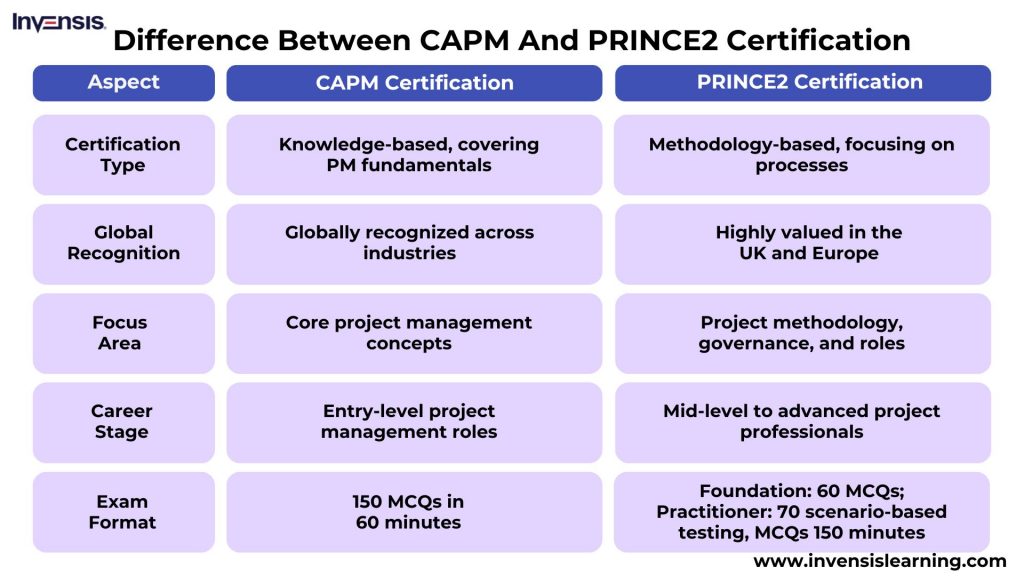
Project management certifications are crucial for professionals aiming to enhance their skills, stand out, and accelerate career growth. Two of the most recognized entry-level certifications are CAPM (Certified Associate in Project Management) and PRINCE2 (Projects IN Controlled Environments) Foundation. While both certifications offer excellent value, they serve different career paths, industries, and professional goals.
So, which one is the right choice for you? In this blog, we’ll break down the key differences between CAPM and PRINCE2, compare their benefits, and help you determine which certification aligns best with your career.
Table Of Contents
- CAPM Certification Fundamentals
- Key Highlights of the CAPM Certification
- PRINCE2 Certification Fundamentals
- Key Highlights of the PRINCE2 Certification
- PRINCE2 vs. CAPM Certification
- Factors to Consider When Choosing Between PRINCE2 and CAPM Certifications
- Conclusion
CAPM Certification Fundamentals
The Certified Associate in Project Management (CAPM) is an entry-level certification offered by the Project Management Institute (PMI) that provides a foundational understanding of project management principles, processes, and terminology. Designed for individuals with little to no project management experience, CAPM focuses on key concepts such as project lifecycles, integration, scope, time, cost, and risk management.
Earning a CAPM certification demonstrates your commitment to project management as a career and equips you with globally recognized skills to work effectively as part of a project team. It is ideal for recent graduates or professionals looking to build their expertise and take the first step toward becoming a certified project management professional.
Key Highlights of the CAPM Certification
The CAPM (Certified Associate in Project Management) certification stands out as a foundational credential for individuals starting their journey in project management. Below are the key highlights that define the value and structure of this certification:
- Global Recognition: The CAPM certification is internationally recognized, showcasing your proficiency in project management principles and practices across industries
- Foundation in Project Management: It focuses on the fundamentals of project management as outlined in the PMBOK Guide, covering critical areas like scope, schedule, cost, quality, risk, and stakeholder management
- Eligibility for Entry-Level Professionals: Designed for individuals with little to no experience, it requires a secondary degree and 23 hours of project management education to qualify
- Comprehensive Exam: The CAPM exam consists of 150 multiple-choice questions, testing knowledge of project management processes, terminology, and best practices
- Career Advancement Opportunities: CAPM opens doors to roles like project coordinator or associate project manager and builds a strong foundation for pursuing advanced certifications like PMP
- Industry Versatility: The certification applies to diverse industries, including IT, healthcare, construction, and manufacturing, making it a versatile choice for professionals
- Skill Validation: CAPM validates your understanding of standardized project management concepts, enhancing your credibility in team and organizational settings
PRINCE2 Certification Fundamentals
PRINCE2 (Projects in Controlled Environments) is a globally recognized project management methodology that provides a structured approach to effectively managing projects. Developed by the UK government and widely adopted across industries, PRINCE2 emphasizes flexibility, scalability, and clear project governance. PRINCE2 certification focuses on dividing projects into manageable stages, ensuring thorough planning, control, and continuous alignment with business objectives.
Levels of PRINCE2 Certification:
PRINCE2 is offered in two primary levels:
- PRINCE2 Foundation: Designed for beginners, this level covers the fundamental principles, processes, and terminology of the PRINCE2 methodology
- PRINCE2 Practitioner: This advanced level focuses on applying PRINCE2 principles in real-world projects and tailoring the methodology to different project environments
Key Highlights of the PRINCE2 Certification
The PRINCE2 certification is a globally recognized qualification that focuses on providing a structured and flexible approach to project management. Here are some of its key highlights:
- Globally Recognized Methodology: PRINCE2 is widely adopted across industries and renowned for its structured project management approach
- Two Certification Levels: It offers PRINCE2 Foundation for beginners and PRINCE2 Practitioner for advanced application of the methodology in real-world scenarios
- No Prerequisites for Foundation Level: The Foundation level is accessible to professionals with no prior experience in project management, making it beginner-friendly
- Scalable and Flexible: PRINCE2 can be tailored to projects of any size, industry, or complexity, ensuring its relevance across diverse environments
- Focus on Roles and Governance: The methodology emphasizes clearly defined roles, responsibilities, and accountability for better project management and communication
- Structured Project Approach: It breaks projects into manageable stages, facilitating better control, monitoring, and alignment with organizational objectives
- Global Career Opportunities: PRINCE2 certification is highly valued, especially in the UK, Europe, and Commonwealth countries, boosting employability in structured project environments
- Practical Exam Design: Foundation exams test theoretical knowledge with multiple-choice questions, while Practitioner exams focus on real-world project scenarios
- Industry Versatility: PRINCE2 is applicable in various sectors, including IT, construction, healthcare, and government, making it a versatile certification for professionals
- Career Advancement: PRINCE2 certification enhances credibility and opens doors to roles such as Project Manager, Team Leader, and Project Coordinator
CAPM vs. PRINCE2 Certification
Choosing the right project management certification is key to advancing your career. PRINCE2 offers a structured methodology ideal for those in industries needing strict project governance, while CAPM, offered by PMI, focuses on fundamental project management principles for those starting their careers. Below, we have compared these two certifications to help you decide which one best suits your professional goals.
| Aspect | CAPM | PRINCE2 |
| Type | Knowledge-based certification | Methodology (Process-driven approach) |
| Certification Levels | 1 level: Entry-level certification | 2 levels: Foundation, Practitioner |
| Focus | Fundamental project management principles | Project governance, control, and structure |
| Methodology | PMBOK Guide-based principles and practices | PRINCE2 – A stage-based project management methodology |
| Eligibility | Secondary degree + 23 hours of project management education required | Foundation: No prerequisites; Practitioner: Foundation or equivalent required |
| Exam Format | 150 multiple-choice questions (3 hours) | Foundation: 60 multiple-choice questions (1 hour); Practitioner: 70 scenario-based testing, MCQs (2.5 hours) |
| Global Recognition | Globally recognized across industries | Primarily in the UK, Europe, and industries like IT, construction, and government |
| Industries | Various industries, including IT, healthcare, and manufacturing | IT, construction, public services, government, etc. |
| Career Advancement | Suitable for those starting their career in project management or seeking a foundation before PMP | Ideal for professionals seeking roles in structured project management environments |
| Key Strength | Comprehensive knowledge of project management principles | Scalability, governance, and clear project roles |
Factors to Consider When Choosing Between PRINCE2 and CAPM Certifications
When choosing between the PRINCE2 and CAPM certifications, it’s important to assess your career goals, industry needs, and the level of certification that suits your experience. Here are key factors to consider:
1. Career Development
PRINCE2 is ideal for those working in structured project environments, especially in industries like IT, construction, and government. It provides a methodology-based framework that is highly valued in the UK and Europe. CAPM is better suited for beginners, offering a broad understanding of project management and serving as a stepping stone to more advanced certifications like PMP. It’s globally recognized, making it ideal for entry-level project management roles.
2. Salary Prospects
Professionals with PRINCE2 certification, especially at the Practitioner level, can expect higher salaries due to their advanced knowledge of project governance and process management. The average salary for a PRINCE2-certified professional is approximately $110k/year, depending on the industry, location, and experience.
CAPM is an entry-level certification and is generally associated with starting roles or junior project management positions. The salary range for CAPM-certified professionals is typically $74k/year, though this can increase as they gain experience and pursue advanced certifications like PMP.
3. Choose Your Certification Training Path
PRINCE2 has a clear learning path at the Foundation and Practitioner levels, focusing on mastering the methodology’s processes and applying them in real-world projects. CAPM is generally quicker to complete and focuses on understanding core project management principles from the PMBOK Guide. It is a great choice for those starting their project management career or seeking foundational knowledge.
4. Geographical Considerations
PRINCE2 is more recognized in Europe and the UK, making it ideal for those planning to work in these regions or industries that require structured project management. CAPM, however, is recognized globally and is beneficial for professionals looking for flexibility to work in various regions, particularly in the U.S. and Canada, where PMI’s PMBOK Guide is widely adopted.
Conclusion
Both CAPM and PRINCE2 certifications offer valuable pathways for career growth in project management, but the right choice depends on your goals and context. CAPM is ideal for those starting their project management journey or working within PMI’s framework. At the same time, PRINCE2 suits professionals seeking expertise in a structured, process-driven methodology popular in Europe and beyond. By aligning your certification choice with your career, industry needs, and geographical focus, you can enhance your skills, credibility, and opportunities in the project management.















